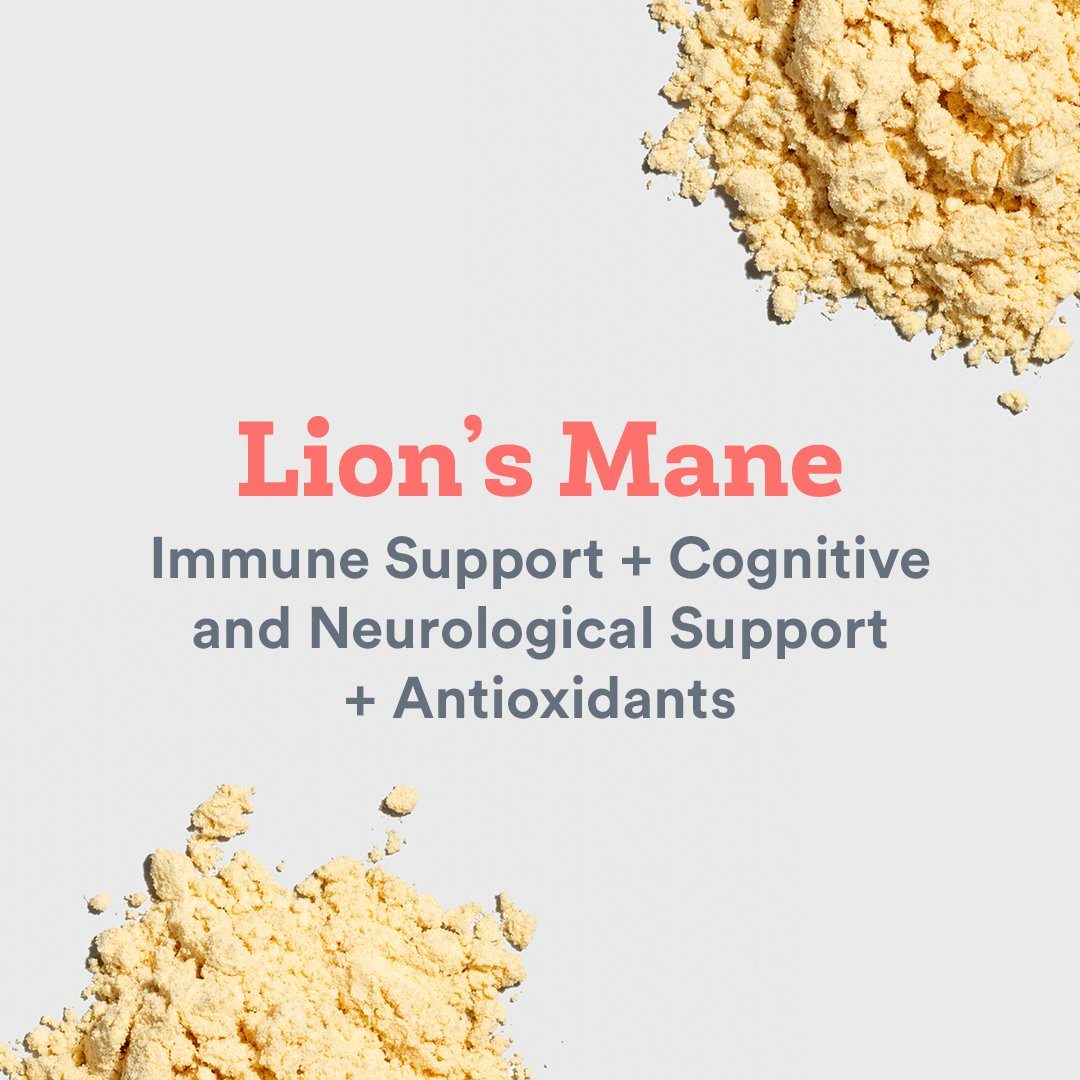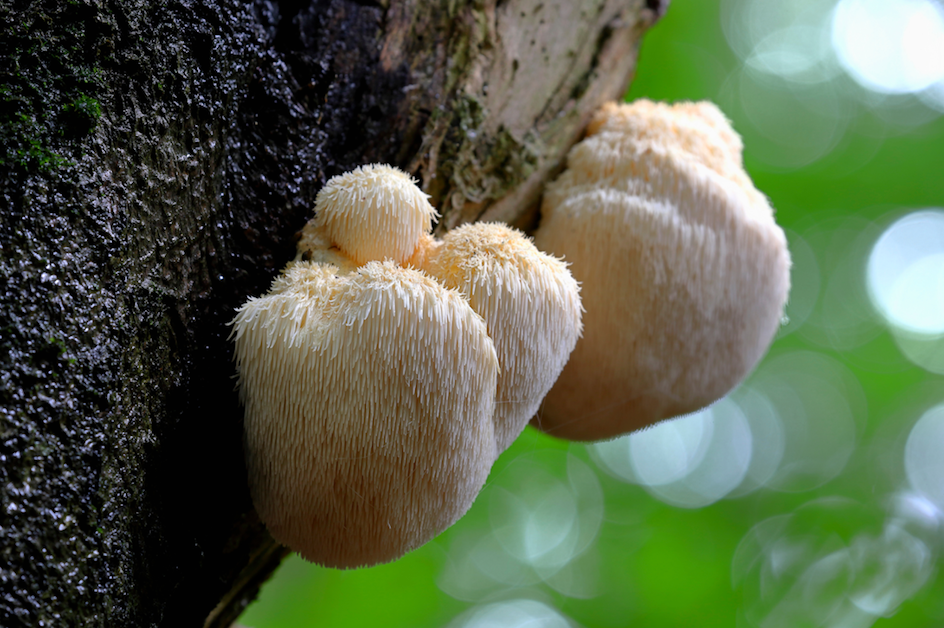
Also known as: Bearded Tooth Mushroom, Yambushitake, Shishigashira,Pom Pom mushroom
Native to: North America, Europe and East Asia
Parts used: Fruiting body and mycelia (all JOYÀ products use Lion's Mane fruiting body)
Top benefits: Antioxidant Rich, Immune Support and Cognitive & Neurological Support

Lion's Mane, the Powerhouse Pompom Mushroom
Lion’s mane mushroom, known traditionally as yamabushitake, is both a culinary and medicinal mushroom that ranges from looking like a giant white fluffy pom pom to looking like the brush end of a mop. It’s native to North America, Europe and East Asia, where it grows wild on deciduous trees and is also extensively cultivated on sawdust substrates.
To date, Lion's mane is consumed widely only in Asian countries for its nutritional and health benefits where it's renowned for its medicinal properties for millennia in Traditional Chinese Medicine (TCM), a form of alternative medicine with millennia of history.
The exceptional nutritional and health benefits of Lion’s mane mushroom, derived from its fruiting body and mycelia, are largely attributed to a number of polysaccharides (carbohydrate molecules), including beta-glucans, and secondary metabolites such as erinacines, hericerins, hericenones, steroids and terpenes. As a result of its demonstrated medicinal potential, Lion’s mane has been the subject of extensive studies to investigate a number of its reported health-promoting properties, including antibiotic, anti-cancer, cardio-protective, liver-protective and neuro-protective actions, as well as its ability to support depression, anxiety and cognitive function.
Preliminary research suggests that the potential benefits of Lion’s mane may include:

Health Benefits of Lion's Mane
Antioxidant Rich
Lion’s mane has been found to be a source of antioxidants, compounds which play a vital, health-protecting role in human life. Antioxidants have been shown to help protect against various metabolic diseases, heart disease, brain disorders and age-related syndromes, as they help the body combat cellular damage caused by free radicals (reactive chemicals containing oxygen), also known as oxidative stress.
Research on Lion’s mane’s antioxidant activity is ongoing, including investigations into its reported liver-protective effects. In vitro and animal studies are showing some promise. (1, 2)
Immune Support
Lion’s mane is the subject of ongoing studies involving the immune system, as it’s been found to be a source of fungal polysaccharides with immune-enhancing properties. Preliminary studies are also demonstrating potential anti-cancer effects. Suggested mechanisms of action include that these polysaccharides trigger an immune response in affected cells of the host by activating certain signal pathways, and also activate macrophages (immune cells that engulf and digest cancer cells).

Cognitive & Neurological Support
Lion’s Mane is said to have been used as a tea for thousands of years by Buddhist monks to enhance brain power, heighten their ability to focus during meditation and to generate “Qi” (vital energy or life force). Fast forward to today, and one of Lion’s mane’s most extensively studied features is its impact on nerve and brain health and cognitive function.
Research on isolated cells, animals and humans has demonstrated a number of neurological effects. For example, in mice, prevention of recognition memory impairment in an Alzheimer’s model, and in another study, significant improvement in recognition memory. In cells, its ability to stimulate the production of a substance known as Nerve Growth Factor (NGF), a specialized protein required for the development of sensory neurons. Finally, double-blind, randomly controlled human trials have also demonstrated cognitive improvements with supplementation of Lion's mane. One trial performed on Japanese men and women diagnosed with mild cognitive impairment found that supplementation significantly increased scores on the cognitive function scale, although this improvement did not last after subjects ceased supplementation. In another trial performed on healthy subjects, supplementation was found to significantly improve certain measures of cognitive function.
What remains unclear is which bioactive compound(s) are responsible for these effects. A number of isolates are being studied (including erinacines and hericanones), and recent research also suggests that polysaccharides are likely involved because crude extracts of Lion’s mane’s fruiting bodies have been reported to induce NGF biosynthesis and protect neuronal cells.
Research in this area is early days, and large scale human studies are lacking. Yet, the positive results displayed to date on brain cells have fueled ongoing studies as researchers work to determine whether Lion’s mane will prove helpful for Alzheimer’s, Parkinson’s and other degenerative neurological conditions.
May Support Digestive Health
Lion’s mane mushroom contains beta-glucans, which is a type of fiber. Early research shows that beta-glucans can help support a balanced gut microbiome by acting as prebiotic fiber.
Don’t get these confused with probiotics, however. Probiotics help seed the gut microbiome with beneficial bacteria, while prebiotics can help support the existing beneficial bacteria – you can think of prebiotics as food for our gut bacteria.
While scientists are still in the early stages of research when it comes to the specific beta-glucans found in Lion’s mane mushroom, the implications appear promising.
Are There Any Side Effects of Lion’s Mane?
Lion’s mane mushroom has been used by humans for centuries and is generally considered safe to take. However, some people may experience side effects. Lion’s mane may cause an allergic reaction, such as itching, hives, or difficulty breathing, if you are allergic to mushrooms.
JOYÀ products that feature Lion's Mane
If you’re wondering where you can try a Lion’s mane supplement for yourself, look no further! JOYÀ Functional Chocolate features powerful combinations of multiple synergistic health-supporting ingredients so that you can take charge of your wellness.
You can find Lion’s mane extract in the following JOYÀ products:
Defend Functional Chocolate: A single-origin, 70 percent dark chocolate bar that combines Lion’s mane mushroom extract with Astragalus extract to support your immune system and fight stress.
The Bottom Line
Lion’s mane mushroom has been used in Traditional Chinese Medicine for centuries due to its multitude of health benefits. This powerful fungus has a lot to offer, including potent antioxidants, immune support, cognitive support, digestive support, and more.
Our Functional Chocolates are an easy and reliable way to incorporate Lion’s mane mushroom into your daily routine. Savor a bar of nutrient-rich Defend Chocolate for anytime immune support!
The health research presented in this article is for informational use only. It is not a replacement for professional health advice and should not be construed as a recommendation of specific products. The products sold on this website are not intended to diagnose, treat, cure, or prevent any disease. This information does not provide dosage or format recommendations or possible drug interactions, and accordingly, should be used with the advice of a qualified health care practitioner.

